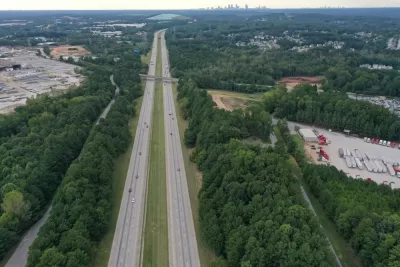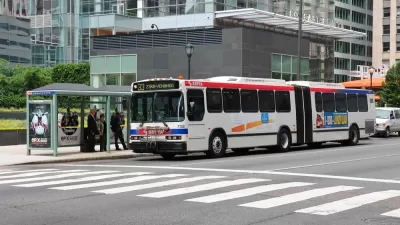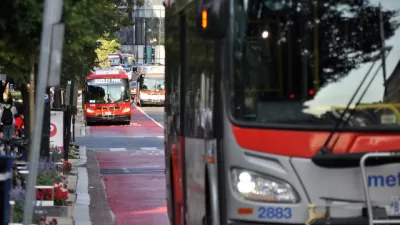An analysis of Clayton County, Georgia, which lost access to public transit for five years, shows a significant increase in unemployment rates and poverty during that timeframe.

A new study from Clayton County, Georgia links a rise in unemployment and poverty to transit cuts, according to an article by Jared Brey in Governing. “The study’s findings support the ‘spatial mismatch’ theory, which holds that poor transit access leads to fewer job opportunities and lower incomes for residents.”
The study analyzed poverty and unemployment rates in the county during five years between 2010 and 2015 when the county had no bus service connecting it to Atlanta, making transit-dependent Clayton County residents unable to reach the city. “In the half-decade interim, the county endured “substantial increases in poverty and unemployment rates” which are explained by the loss of bus access, according to new research published last month in the journal Urban Studies.”
“In general, there’s strong evidence from a variety of research fields that transit access supports good economic outcomes, and that cuts to transit service are economically harmful,” but this study in particular provided a “rare opportunity” for a natural experiment. “It’s often hard to isolate the economic effects of certain events, like the pandemic or natural disasters, because they happen over large areas and affect lots of communities in the same way. But in the case of Clayton County, the researchers were able to compare census tracts that initially had bus access and then lost it with demographically similar tracts that weren’t affected by the cuts.”
FULL STORY: New Evidence Links Transit Cuts With Poverty and Unemployment

Planetizen Federal Action Tracker
A weekly monitor of how Trump’s orders and actions are impacting planners and planning in America.

Restaurant Patios Were a Pandemic Win — Why Were They so Hard to Keep?
Social distancing requirements and changes in travel patterns prompted cities to pilot new uses for street and sidewalk space. Then it got complicated.

Map: Where Senate Republicans Want to Sell Your Public Lands
For public land advocates, the Senate Republicans’ proposal to sell millions of acres of public land in the West is “the biggest fight of their careers.”

Maui's Vacation Rental Debate Turns Ugly
Verbal attacks, misinformation campaigns and fistfights plague a high-stakes debate to convert thousands of vacation rentals into long-term housing.

San Francisco Suspends Traffic Calming Amidst Record Deaths
Citing “a challenging fiscal landscape,” the city will cease the program on the heels of 42 traffic deaths, including 24 pedestrians.

California Homeless Arrests, Citations Spike After Ruling
An investigation reveals that anti-homeless actions increased up to 500% after Grants Pass v. Johnson — even in cities claiming no policy change.
Urban Design for Planners 1: Software Tools
This six-course series explores essential urban design concepts using open source software and equips planners with the tools they need to participate fully in the urban design process.
Planning for Universal Design
Learn the tools for implementing Universal Design in planning regulations.
Heyer Gruel & Associates PA
JM Goldson LLC
Custer County Colorado
City of Camden Redevelopment Agency
City of Astoria
Transportation Research & Education Center (TREC) at Portland State University
Camden Redevelopment Agency
City of Claremont
Municipality of Princeton (NJ)





























